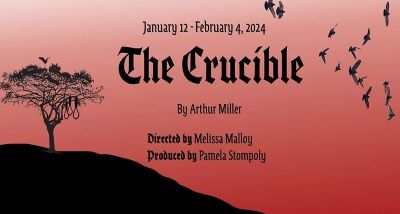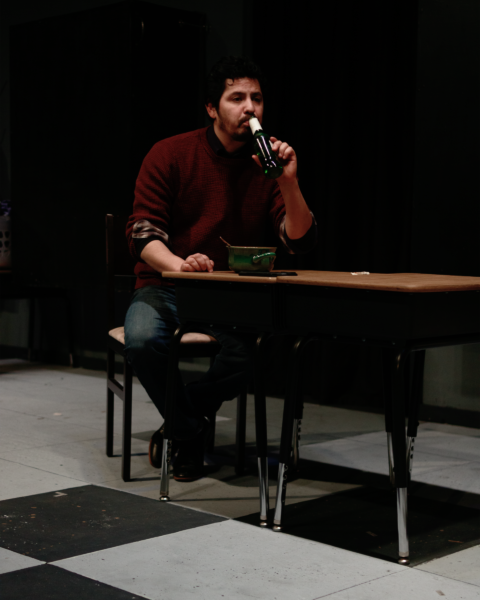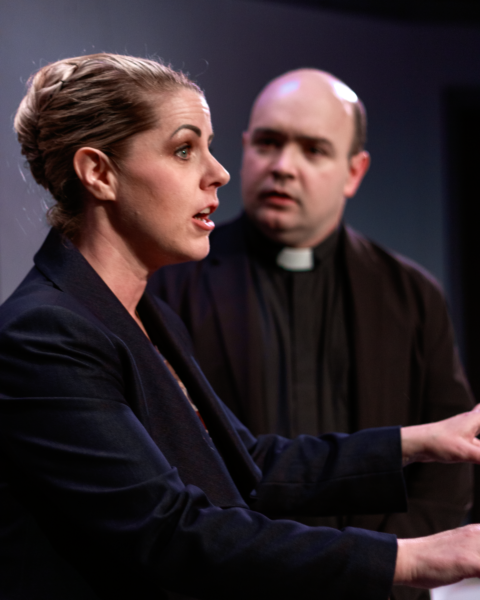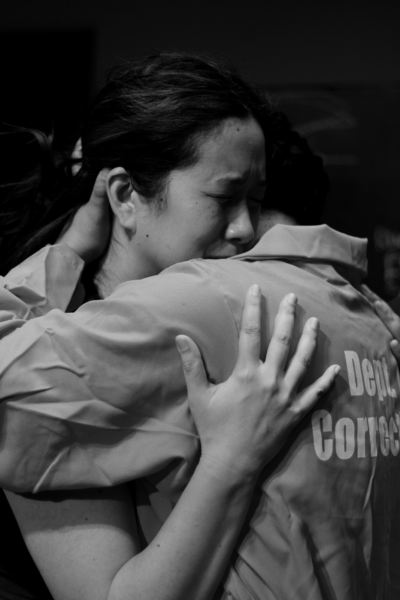KNOWING WHICH IS WITCH
The word “crucible” has two very different meanings. One is a pot in which substances are heated to high temperatures. Another is a situation in which people are severely tested. Which definition is The Crucible based on? A case could easily be made for either and likely both for playwright Arthur Miller. Much as it conveys 1693 Salem (scare tactics that spread across New England before opposition could end them), Miller’s 1953 domestic tragedy targeted Joseph McCarthy’s anti-Communist congressional “show trials” by the House Un-American Activities Committee. A taut, topical script, this masterpiece matters whenever it’s done, as fear makes people hunt “witches” in pursuit of a false security. Miller himself was among the many assaulted by that dark period in American history.
330 years ago, a witch hunt gave this continent one of its most chilling and cautionary cases of panic-peddling and persecution: In assorted “witch trials,” the supposedly godly townsfolk of Salem, Massachusetts executed 19 innocent fellow humans. Part class-ridden repression, part naked plunder (these hangings facilitated some very convenient land grabs), and part ecclesiastical pogrom, the mass mania pitted neighbor against neighbor, making any eccentricity or non-conformity — even a penchant for reading — grounds for false accusation, a sham trial, and death by hanging. It was a lethal spree of recrimination masquerading as righteousness.
Call it what you will — political correctness, restrictive immigration, fake news, alternative facts, NSA espionage, cyberhacked rumor-mongering, loyalty oaths or pledges of allegiance — this combination of communal coercion and institutional surveillance remains a chilling formula for fascism. Worse, it’s far more efficient, omnipresent and implacable today than these quaintly superstitious colonists ever imagined.
In the powerful production at Lamplighters, director Melissa Malloy sets the production in 2020, which makes the most out of correlating parts of our world to Salem. No reference is made to the year and her modernization does not alter the formal language style that Miller penned. Something about gender-switching some roles, modern dress, and characters occasionally in face masks and using hand sanitizers makes this play hit closer to home. As Miller intended, we understand that the fears and power-plays which catapulted Salem into a feeding frenzy are still happening right now. To her credit, Malloy utilizes eighteen actors to cover the overwhelming twenty-one roles in this three-hour play.
Miller’s plot construction still amazes and, with its operatic acting opportunities and enough cliff-hangers for a dozen melodramas, few plays ride such a roller-coaster of hope and hate. Forget your garden-variety haunted house — this is a haunted town at its cold-core worst. Every scene lurches in a new direction to tighten the nooses around the beleaguered townsfolk. Each attempt to demonstrate a villager’s virtue is perversely confounded by the smug dismissal that “if you have nothing to hide, you have nothing to fear.” The midnight romps of teenage girls morph into venomous accusations involving the unexplained deaths of seven newborn babies, voodoo “poppets” and piercing needles, demon possession, and a yellow bird that casts killer shadows. A scorecard is almost needed to keep track of so many subplots. Also, know that different women are named Goody, a term which essentially meant “Mrs.” in certain seventeenth-century social classes.
Our protagonist is John Proctor (John Carroll), a man of strong opinion, entirely too outspoken for such Puritanical times in New England. John is married to Elizabeth (Yvonne Nguyen) who is established as a woman so pure-hearted that she cannot lie. During a difficult bout in their relationship, prior to the start of the play, John has had an affair with Elizabeth’s much younger maid, Abigail (Camelina Cedillo), who is the niece of the town’s minister Reverend Samuel Parris (Matt Sayre). Think “Captain of the Mean Girls” for Abigail. She had beguiled John, despite the illegality of adultery in this Bible-based society. Let’s just say that she did not take lightly to being fired when Elizabeth suspected the dalliance, nor did she handle gracefully John’s intention to end things after she was let go.
The play opens with Abigail and her friends being interrogated about some recent indecent and questionable activities (dancing in the woods after dark, horrors!). The adults are terrified that the girls might have been up to witchcraft. In attempts to deflect attention from themselves, the adolescents’ accusations of others are unleashed, which waterfall into more and more finger-pointing. Because of the paranoia against witchcraft at that time, coupled with terror of the heavy-fisted Christian courts, over a hundred people are accused and jailed. Nonsensical confessions are demanded from them to avoid hanging. John and Elizabeth are pulled into this vicious web as Act I ends.
Act II is primarily the period of the trials, introducing the fascinating near-central character of Judge Danforth (Linda Benning). Danforth is determined that right be done. She could almost be admirable if it weren’t for the fact that her faith is so strong as to overcome any actual logic — dozens will die at the hand of her merciless methods. An additionally striking character is that of Reverend Hale (Raymond Evans) who is both staunch in his faith and comprehension of a great injustice, but powerless to stop the avalanche of human destruction. It’s chilling when John is asked if he is with the court or against it, as if to disagree at all makes him the enemy.
Mr. Carroll was a terrific find for the company. If he had been a one-note of anger through the production, it probably would have gone stale. Instead, we feel a great range of emotions as John tries to do what’s right for himself, his wife (whom he truly loves, despite the affair) and his community. The decisions he must face (which may destroy others), and with whom to side, are gut-wrenching. Carroll conveys this beautifully. Mr. Evans captures Hale’s internal torture of deeply loving the church while watching it supplant logic, kindness, and actual justice.
In Act I, Carmelina Cedillo doesn’t quite capture the vileness of Abigail, simply seeming young and somewhat selfish, but — holy cow — does she land it triumphantly in Act II. One of the most memorable moments of the show is a simple sly look she gives John after declaring a bold lie that may sink him; a good chunk of audience members let out an audible gasp at that.
The play’s powerful payoff is its final, soul-stirring sacrifice. An act of utterly unexpected decency, in this self-darkened, fear-mongering, and religion-plagued world of suspicion and paranoia, it stands out like the star over Bethlehem.
photos by Steve Murdock
The Crucible
Lamplighters Community Theatre, 5915 Severin DriveFri and Sat at 8; Sun at 2ends on February 4, 2024for tickets ($23 – $26), call 619.303.5092 or visit Lamplighters








{ 2 comments… read them below or add one }
This is a great review, but you left out some characters who left a permanent mark on our hearts! Shout out to Giles, Mary and Cheevers. They were more memorable than anyone, if you ask me. Congrats to ALL!!!
Darlene Cleary needs to be back onstage. Her brilliance needs to be shared! I love her acting!